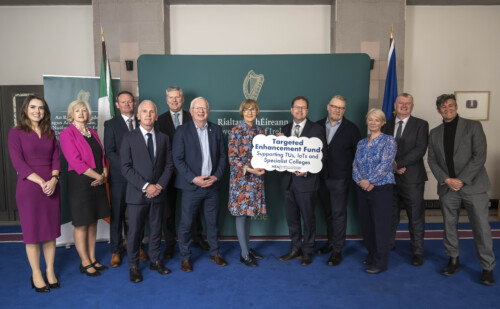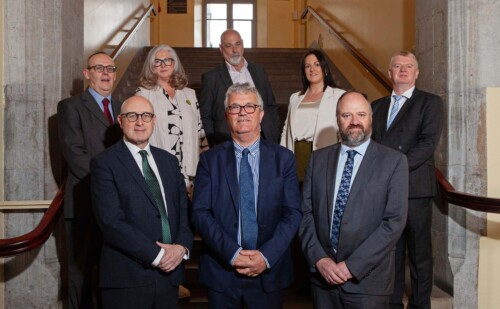Minister Harris announces €5 million funding in recognition of positive performance by higher education institutions
By Maura O'Shea
Posted: 23 September, 2021

Minister for Further and Higher Education, Research, Innovation and Science, Simon Harris, T.D., has today announced five performance funding awards totalling €5 million to higher education institutions in recognition of positive performance in working towards national strategic objectives. Each award is valued at €1 million.
Speaking today, Minister Harris said: “I would like to congratulate the successful institutions on submitting high quality case studies that provide us with a snapshot of some of the exciting and innovative initiatives ongoing in higher education.
The institutions receiving awards today are clearly making a positive and significant impact on Irish society, in areas such as inclusion and gender equality, leadership and sustainability, and are helping create an Ireland that is progressive, and one in which every person has the same opportunities to reach their potential.”
The awards were determined on the basis of an evaluation of 21 Impact Case Studies submitted by higher education institutions (HEIs) to the Higher Education Authority (HEA) in March 2021.
The HEIs were invited to submit case studies to showcase innovative initiatives that made a valuable contribution towards national strategic objectives set out in the Higher Education System Performance Framework and evolving national policy priorities. The submissions were assessed by an independent panel of expert advisors based on criteria determined by the HEA.
The awards will be made to AIT/LIT, IT Carlow, MTU, NUIG and UCC in recognition of their positive performance.
Dr Alan Wall, CEO of the HEA, added: “I’m particularly delighted that progressive initiatives aimed at facilitating participation in higher education by some of the more underrepresented and disadvantaged groups in our society have received well deserved recognition through these awards.
One of the primary benefits of this process is the rich learning that has been collated by the HEA, which we will disseminate widely so that it can be embedded across the higher education sector.”
Among the successful case studies is one from IT Carlow which details the development and delivery of a Certificate in Family Caring in partnership with Family Carers Ireland (FCI), and one from UCC that details innovative programmes that support inclusive education pathways for students with intellectual disabilities.
NUI Galway has been awarded for a case study detailing recent action to advance gender equality, while Munster Technological University secured an award for their case study outlining an innovative leadership development programme.
One of the awards is granted jointly to Athlone IT and Limerick IT on the basis of two separate case studies on their participation in the Regional University Network European University (RUN-EU) initiative. Athlone IT and Limerick IT will formally merge to form the new Technological University of the Shannon: Midlands Midwest on 1st October 2021.
The funding awards can be used to expand and progress existing initiatives or put towards new initiatives that contribute towards national strategic imperatives. Oversight of the funding awarded will be managed by the HEA.
The successful case studies have been published here on the HEA’s website.
| HEI | Impact Assessment Case Study Title | Award |
| AIT & LIT | Regional University Network – European University (RUN-EU) | €1m |
| ITC | Supporting Family Carers Across Ireland | €1m |
| MTU | Teaching, Learning, Assessment & Student Engagement (TLASE) – Enhancement through Leadership Development and Partnership Approaches | €1m |
| NUIG | NUI Galway Delivering on Gender Equality | €1m |
| UCC | Inclusive Education Pathways for Students with Intellectual Disabilities at UCC | €1m |
| Total | €5m |
Table 1: Performance Funding Awards 2021
Notes to Editors:
Background to Performance Funding:
The System Performance Framework 2018-2020 is the key policy framework that guides the strategy and performance dialogue process that the HEA facilitates with higher education institutions. The process, following the key priorities set out in the framework, serves as the foundation for system development and performance management, informs investment decisions and provides the basis on which to build greater transparency and accountability in the future. It also enables the HEA to manage system risks.
Mission-Based Performance Compacts were agreed with individual HEIs in early 2019, aligned with the System Performance Framework 2018-2020 and each institution’s strategic plan.
In response to recommendations in reports such as the Review of the Allocation Model for Funding Higher Education Institutions in 2018, a process for recognising the positive performance of institutions was introduced in 2019.
€5million in performance funding has been allocated by government in 2021 to reward higher education institutions (HEIs) for positive performance as part of the Strategy and Performance Dialogue process.
To inform the allocation of performance funding, HEIs were requested to submit impact assessment case studies aligned with national priorities and targets and evolving national policy objectives detailed below:
Key System Objectives for the Higher Education System 2018–2020
- Providing a strong talent pipeline combining knowledge, skills & employability which responds effectively to the needs of our enterprise, public service and community sectors, both nationally and regionally, and maintains Irish leadership in Europe for skill availability;
- Creating rich opportunities for national and international engagement which enhances the learning environment and delivers a strong bridge to enterprise and the wider community;
- Excellent research, development and innovation that has relevance, growing engagement with external partners and impact for the economy and society and strengthens our standing to become an Innovation Leader in Europe;
- Significantly improves the equality of opportunity through Education and Training and recruits a student body that reflects the diversity and social mix of Ireland’s population;
- Demonstrates consistent improvement in the quality of the learning environment with a close eye to international best practice through a strong focus on quality & academic excellence;
- Demonstrates consistent improvement in governance, leadership and operational
Evolving National Policy Objectives / Themes
- Student progression (HEA 2018, Report on progression of undergraduate students);
- Graduate employability (HEA 2018, First Destinations Report);
- Addressing Teacher Supply Challenges (DES 2018, Teacher Supply Action Plan);
- Sustainable development (National Strategy on Education for Sustainable Development 2014–2020);
- Climate Action (Climate Action Plan 2019);
- Informed consent (DES 2019, Framework for Consent in Higher Education Institutions);
- Enhancement of counselling services in higher education institutions (Main Features of Budget 2019: Education & Skills);
- Mental Health (Wellbeing Policy Statement and Framework for Practice 2018 – 2023).
- Student Engagement (HEA, 2016, Enhancing student engagement in decision-making; National Student Engagement Programme)


